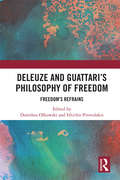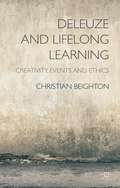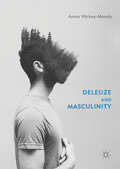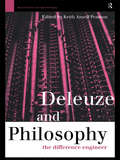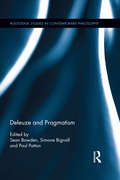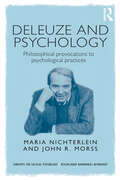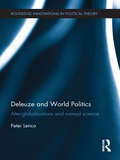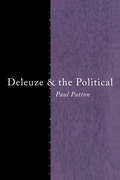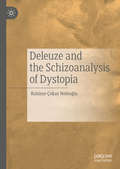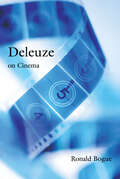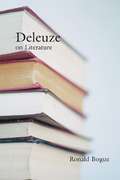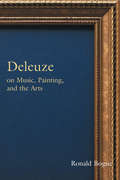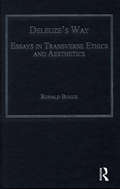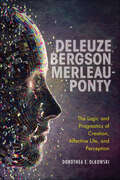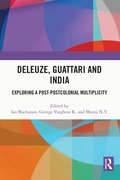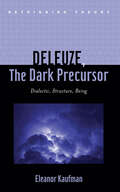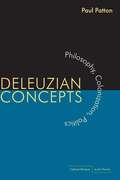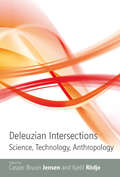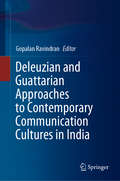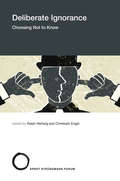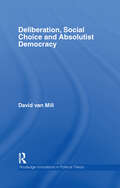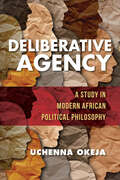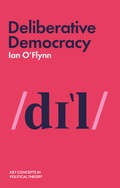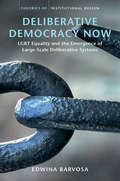- Table View
- List View
Deleuze and Guattari's Philosophy of Freedom: Freedom’s Refrains
by Dorothea Olkowski Eftichis PirovolakisThis volume addresses the issue of freedom in the philosophy of Deleuze and Guattari. This is all the more challenging in that Deleuze-Guattari almost never use the term freedom, preferring instead, the concept of the refrain. The essays collected in the volume show that freedom has been understood in a remarkably narrow sense and that in fact freedom operates as the refrain in every realm of thought and creation. The motivating approach in these essays is Deleuze-Guattari’s emphasis on the irreality of media and capitalistic sign regimes, which they perceive to have taken over even the practices of philosophy, the arts, and science. By offering a clear and engaging treatment of the underexplored issue of freedom, this volume moves the discussion of Deleuze-Guattari’s philosophy forward in ways that will appeal to researchers in Continental philosophy and a wide range of other disciplines.
Deleuze and Lifelong Learning
by Christian BeightonThis book examines Gilles Deleuze's ideas about creativity in the context of lifelong learning, offering an original take on this important contemporary topic using cinematic parallels. Discussing Deleuze's difficult notion of 'counter-actualization' as a form of creative practice, it draws practical consequences for those across a diverse sector.
Deleuze and Masculinity
by Anna Hickey-MoodyThis book uses Deleuze’s work to understand the politics of masculinity today. It analyses masculinity in terms of what it does, how it operates and what its affects are. Taking a pragmatic approach, Hickey-Moody shapes chapters around key Deleuzian concepts that have proved generative in masculinity studies and then presents case studies of popular subjects and offers overviews of disciplines that have applied Deleuze’s work to the study of men’s lives. This book shows how the concepts of affect and assemblage have contributed to, and transformed, the work undertaken by the foundational concept of performativity in gender studies. Examining the work of Deleuze and Guattari on the psychoanalytic boy, as exemplified by their writing on Little Hans, Hickey-Moody reconsiders the politics of their approach to psychoanalytic models of young masculinity. In this context, the author examines contemporary lived performances of young masculinity, drawing on her own fieldwork. <P><P> The field of disability and masculinity studies has taken up the work of Deleuze and Guattari in a nearly unprecedented fashion. Accordingly, the book also explores the gendered nature of disability, and canvases some of the substantive scholarly contributions that have been made to this interdisciplinary space, before introducing case studies of the work of North American photographer Michael Stokes and the popular Hollywood film Me Before You. The book provocatively concludes by challenging scholars to take up Deleuze’s thought to re-shape gendered economies of knowledge and matter that support and contribute to systems of patriarchal domination mediated through environmental exploitation.
Deleuze and Philosophy: The Difference Engineer (Warwick Studies in European Philosophy)
by Keith Ansell-PearsonThe work of Gilles Deleuze has had an impact far beyond philosophy. He is among Foucault and Derrida as one of the most cited of all contemporary French thinkers. Never a student 'of' philosophy, Deleuze was always philosophical and many influential poststructuralist and postmodernist texts can be traced to his celebrated resurrection of Nietzsche against Hegel in his Nietzsche and Philosophy, from which this collection draws its title. This searching new collection considers Deleuze's relation to the philosophical tradition and beyond to the future of philosophy, science and technology. In addition to considering Deleuze's imaginative readings of classic figures such as Spinoza and Kant, the essays also point to the meaning of Deleuze on 'monstrous' and machinic thinking, on philosophy and engineering, on philosophy and biology, on modern painting and literature. Deleuze and Philosophy continues the spirit of experimentation and invention that features in Deleuze's work and will appeal to those studying across philosophy, social theory, literature and cultural studies who themselves are seeking new paradigms of thought.
Deleuze and Pragmatism (Routledge Studies in Contemporary Philosophy)
by Paul Patton Sean Bowden Simone BignallThis collection brings together the philosophy of Gilles Deleuze and the rich tradition of American pragmatist thought, taking seriously the commitment to pluralism at the heart of both. Contributors explore in novel ways Deleuze’s explicit references to pragmatism, and examine the philosophical significance of a number of points at which Deleuze’s philosophy converges with, or diverges from, the work of leading pragmatists. The papers of the first part of the volume take as their focus Deleuze’s philosophical relationship to classical pragmatism and the work of Peirce, James and Dewey. Particular areas of focus include theories of signs, metaphysics, perspectivism, experience, the transcendental and democracy. The papers comprising the second half of the volume are concerned with developing critical encounters between Deleuze’s work and the work of contemporary pragmatists such as Rorty, Brandom, Price, Shusterman and others. Issues addressed include antirepresentationalism, constructivism, politics, objectivity, naturalism, affect, human finitude and the nature and value of philosophy itself. With contributions by internationally recognized specialists in both poststructuralist and pragmatist thought, the collection is certain to enrich Deleuze scholarship, enliven discussion in pragmatist circles, and contribute in significant ways to contemporary philosophical debate.
Deleuze and Psychology: Philosophical Provocations to Psychological Practices (Concepts for Critical Psychology)
by Maria Nichterlein John R. MorssAn increasing number of scholars, students and practitioners of psychology are becoming intrigued by the ideas of Gilles Deleuze and of Felix Guattari. This book aims to be a critical introduction to these ideas, which have so much to offer psychology in terms of new directions as well as critique. Deleuze was one of the most prominent philosophers of the 20th century and a figure whose ideas are increasingly influential throughout the humanities and social sciences. His work, particularly his collaborations with psychoanalyst Guattari, focused on the articulation of a philosophy of difference. Rejecting mainstream continental philosophy just as much as the orthodox analytical metaphysics of the English-speaking world, Deleuze proposed a positive and passionate alternative, bursting at the seams with new concepts and new transformations. This book overviews the philosophical contribution of Deleuze including the project he developed with Guattari. It goes on to explore the application of these ideas in three major dimensions of psychology: its unit of analysis, its method and its applications to the clinic. Deleuze and Psychology will be of interest to students and scholars of psychology and those interested in continental philosophy, as well as psychological practitioners and therapists.
Deleuze and World Politics: Alter-Globalizations and Nomad Science (Routledge Innovations in Political Theory)
by Peter LencoThe central argument of this book is that the univocal ontology and corresponding immanent metaphysics of the French philosopher Gilles Deleuze (1925-1995) can provide a theoretical perspective capable of accounting for the complex nature of world politics. Drawing on a wide variety of Deleuze’s writings, it develops a thorough investigation of his ontology and metaphysics as they pertain to core questions of world politics such as power, identity, hierarchy, space, time, territory and the state. The book explores the dynamics of contemporary world politics and issues by focusing on the ‘anti’ or ‘alter-globalization movement’ (AGM). It analyses several approaches to social and political theory which deal explicitly with the AGM including global governance theory, international relations, social movement theory, Marxism, and post-Marxism. These are contrasted with a larger Deleuzian theory which can be of use when addressing the diffuse, and often paradoxical aspects of world politics. Deleuze’s work poses a major challenge to traditional understanding of global politics and this book will be of considerable interest to those with an interest in social and political theory, critical international relations and globalization studies.
Deleuze and the Non/Human
by Jon Roffe Hannah StarkDeleuze and the Non/Human brings together leading international voices to consider the place of the philosophy of Gilles Deleuze in the nonhuman turn. It examines recent debates about the figure of the nonhuman in fields such as new materialism, speculative realism, animal studies, and the environmental and ecological Humanities and scrutinizes the debt to Deleuze's work that is evident in these emerging fields. Accordingly, the contributors to the volume are drawn from across the academy. Deleuze's philosophy already anticipated many of the current debates about the non/human. The proposed volume continues this engagement, extending some of these lines of investigation, in disciplines such architecture, literary studies, gender studies, philosophy, geography and cultural studies. At the same time, its goal is to open up a critical line of questioning about what the nonhuman means in Deleuze's work itself. Deleuze and the Non/Human is thus both about the non/human from Deleuze's point of view, and about Deleuze from the point of view of the various problematics that can be included in the nonhuman turn. Deleuze and the Non/Human makes a timely intervention in a broad set of interdisciplinary debates, and demonstrates once again the force of Deleuze's philosophy for our critical examination of the contemporary condition.
Deleuze and the Political (Thinking the Political)
by Paul PattonWith clarity, precision and economy, Paul Patton synthesizes the full range of Deleuze's work. He interweaves with great dexterity motifs that extend from his early works, such as Nietzsche and Philosophy, to the more recent What is Philosophy? and his key works such as Anti-Oedipus and Difference and Repetition. Throughout, Deleuze and the Political demonstrates Deleuze's relevance to theoretical and practical concerns in a number of disciplines including philosophy, political theory, sociology, history, and cultural studies.Paul Patton also presents an outstandingly clear treatment of fundamental concepts in Deleuze's work, such as difference, power, desire, multiplicities, nomadism and the war machine and sets out the importance of Deleuze to poststructuralist political thought.It will be essential reading for anyone studying Deleuze and students of philosophy, politics, sociology, literature and cultural studies.
Deleuze and the Schizoanalysis of Dystopia
by Rahime Çokay NebioğluThis book offers an insightful history of dystopian literature, integrating it within the conceptual schemas of Deleuze and Guattari. Unlike earlier examples of dystopia which depict representations of a possible future that is remarkably worse than present society, contemporary dystopia often tends to portray an almost allegorical re-presentation of present society. Tracing dystopia’s shift from transcendence towards immanence with the rise of late neoliberal capitalism and control-societies, Çokay Nebioğlu skilfully constructs a new taxonomy of dystopian fiction to address this changing dynamic. Accompanied by a subtle exploration of earlier and later examples of the genre by George Orwell, Aldous Huxley, Suzanne Collins, Veronica Roth, William Gibson, Max Barry, Dave Eggers, Cindy Pon, and Tahsin Yücel along with rich and nuanced analysis of China Mieville’s Perdido Street Station and Margaret Atwood’s MaddAddam trilogy, the book seeks not only to track the transformation of dystopia in light of worldwide cultural, political and economic transformation, but also to conduct a schizoanalytic reading of dystopia, thus opening up an exciting field of enquiry for Deleuzian scholars.
Deleuze on Cinema (Deleuze And The Arts Ser.)
by Ronald BogueFirst published in 2003. Routledge is an imprint of Taylor & Francis, an informa company.
Deleuze on Literature (Deleuze and the Arts)
by Ronald BogueThis is the first comprehensive introduction to Deleuze's work on literature. It provides thorough treatments of Deleuze's early book on Proust and his seminal volume on Kafka and minor literature. Deleuze on Literature situates those studies and many other scattered writings within a general project that extends throughout Deleuze's career-that of conceiving of literature as a form of health and the writer as a cultural physician.
Deleuze on Music, Painting, and the Arts (Deleuze and the Arts)
by Ronald BogueFirst published in 2003. Routledge is an imprint of Taylor & Francis, an informa company.
Deleuze's Way: Essays in Transverse Ethics and Aesthetics
by Ronald BogueAddressing the essential question of the relationship between ethics and aesthetics in Deleuze's philosophy this book provides clear indications of the practical implications of Deleuze's approach to the arts through detailed analyses of the ethical dimension of artistic activity in literature, music, and film. Bogue examines Deleuze's "transverse way" of interrelating the ethical and the aesthetic, the transverse way being both a mode of thought and a practice of living. Among the issues examined are those of the relationship of music to literature, the political vocation of the arts, violence in popular music, the ethics and aesthetics of education, the use of music and sound in film, the role of the visual in literary invention, the function of the arts in cross cultural interactions, and the future of Deleuzian analysis as a means of forming an open, reciprocally self-constituting, transcultural global culture.
Deleuze, Bergson, Merleau-Ponty: The Logic and Pragmatics of Creation, Affective Life, and Perception
by Dorothea E. OlkowskiDeleuze, Bergson, Merleau-Ponty: The Logic and Pragmatics of Creation, Affective Life, and Perception offers the only full-length examination of the relationships between Deleuze, Bergson and Merleau-Ponty. Henri Bergson (1859–1941), Maurice Merleau-Ponty (1908-1961), and Gilles Deleuze (1925–1995) succeeded one another as leading voices in French philosophy over a span of 136 years. Their relationship to one another's work involved far more than their overlapping lifetimes. Bergson became both the source of philosophical insight and a focus of criticism for Merleau-Ponty and Deleuze. Deleuze criticized Merleau-Ponty's phenomenology as well as his interest in cognitive and natural science. Author Dorothea Olkowski points out that each of these philosophers situated their thought in relation to their understandings of crucial developments and theories taken up in the history and philosophy of science, and this has been difficult for Continental philosophy to grasp. She articulates the differences between these philosophers with respect to their disparate approaches to the physical sciences and with how their views of science function in relation to their larger philosophical projects. In Deleuze, Bergson, Merleau-Ponty, Olkowski examines the critical areas of the structure of time and memory, the structure of consciousness, and the question of humans' relation to nature. She reveals that these philosophers are working from inside one another's ideas and are making strong claims about time, consciousness, reality, and their effects on humanity that converge and diverge. The result is a clearer picture of the intertwined workings of Continental philosophy and its fundamental engagement with the sciences.
Deleuze, Guattari and India: Exploring a Post-Postcolonial Multiplicity
by Varghese George Buchanan Ian Manoj N. Y.This book presents a pragmatic engagement between the philosophy of Deleuze and Guattari and various facets of Indian society, culture and art. The universal appeal of the philosophy of Deleuze and Guattari finds its due place in India with a set of innovative analyses and radical interpretations that reimagine India as a complex multiplicity. The volume brings together scholars from various disciplines and theoretical orientations to explore a wide range of issues in contemporary India, like dalit and caste studies, nationalism, gender question, art and cinema, and so on under the rubric of Deleuzo-Guattarian philosophy. This interdisciplinary book will be useful to scholars and researchers of philosophy, anthropology, cultural studies, sociology, postcolonial studies and South Asian studies.
Deleuze, The Dark Precursor: Dialectic, Structure, Being (Rethinking Theory)
by Eleanor KaufmanA thoughtful and original analysis of the writings of influential French philosopher Gilles Deleuze.Gilles Deleuze is considered one of the most important French philosophers of the twentieth century. Eleanor Kaufman situates Deleuze in relation to others of his generation, such as Jean-Paul Sartre, Pierre Klossowski, Maurice Blanchot, and Claude Lévi-Strauss, and she engages the provocative readings of Deleuze by Alain Badiou and Slavoj Žižek.Deleuze, The Dark Precursor is organized around three themes that critically overlap: dialectic, structure, and being. Kaufman argues that Deleuze's work is deeply concerned with these concepts, even when he advocates for the seemingly opposite notions of univocity, nonsense, and becoming. By drawing on scholastic thought and reading somewhat against the grain, Kaufman suggests that these often-maligned themes allow for a nuanced, even positive reflection on apparently negative states of being, such as extreme inertia. This attention to the negative or minor category has implications that extend beyond philosophy and into feminist theory, film, American studies, anthropology, and architecture.
Deleuzian Concepts
by Paul PattonPatton (philosophy, U. of New South Wales, Australia) gathers and reworks previous of his writings on the later political philosophy of French philosopher Gilles Deleuze (1925-1995). He focuses on three main issues: the conception of philosophy as the creation of concepts as elaborated with Félix Guattari in What is Philosophy?; attempts to understand the nature of events "by distinguishing between a virtual and an actual dimension or between pure and incarnate events," and the political nature and implications of the preceding. He carries out this discussion by describing Deleuze's thought and setting it into conversation with other issues and the works of other philosophers, including French contemporaries such as Jacques Derrida and Michel Foucault, as well as Anglophone contemporaries not often connected to Deleuze's work, such as Richard Rorty and John Rawls. Annotation ©2010 Book News, Inc. , Portland, OR (booknews. com)
Deleuzian Intersections
by Casper Bruun Jensen Kjetil RodjeScience and technology studies, cultural anthropology and cultural studies deal with the complex relations between material, symbolic, technical and political practices. In a Deleuzian approach these relations are seen as produced in heterogeneous assemblages, moving across distinctions such as the human and non-human or the material and ideal. This volume outlines a Deleuzian approach to analyzing science, culture and politics.
Deleuzian and Guattarian Approaches to Contemporary Communication Cultures in India
by Gopalan RavindranThis book sheds new light on Indian communication cultures and the critical philosophical trajectories of Gilles Deleuze and Felix Guattari. It explores issues such as contemporary communication cultures in India, nationalism, subjectivities, negotiating and protesting bodies, music on social media, children on reality television, and the materialities of Indian films. The book provides a balance between issues of communication from a philosophical perspective and issues of philosophy from a communication perspective in the Indian context. This engaging examination of two modes of thought is an important resource for anyone interested in communication studies, modern philosophy, cultural and media studies.
Deliberate Ignorance: Choosing Not to Know (Strüngmann Forum Reports #29)
by Ralph Hertwig Christoph EngelPsychologists, economists, historians, computer scientists, sociologists, philosophers, and legal scholars explore the conscious choice not to seek information.The history of intellectual thought abounds with claims that knowledge is valued and sought, yet individuals and groups often choose not to know. We call the conscious choice not to seek or use knowledge (or information) deliberate ignorance. When is this a virtue, when is it a vice, and what can be learned from formally modeling the underlying motives? On which normative grounds can it be judged? Which institutional interventions can promote or prevent it? In this book, psychologists, economists, historians, computer scientists, sociologists, philosophers, and legal scholars explore the scope of deliberate ignorance.
Deliberation, Social Choice and Absolutist Democracy (Routledge Innovations in Political Theory #Vol. 22)
by David van MillSocial choice theory and theories of deliberative discourse have deeply impacted on the way political scientists understand the dynamics of democratic politics and decision-making. Deliberation, Social Choice and Absolutist Democracy addresses the dispute between these competing schools of thought. Deliberative democracy and social choice theorists offer the two dominant and competing conceptions of participation in contemporary democratic theory. With the former holding that theories of discourse tell us that through the democratic process we can arrive at consensus, rational outcomes and even principles of justice, while the latter suggest that fair and equal participation is more likely to lead to instability and irrational outcomes. With an in-depth examination of social choice theory and deliberative democracy, David van Mill: presents two case studies on the American Continental Congress 1774-1789 provides an assessment of the types of institutions that will promote radical democracy and create stable outcomes with the minimum sacrifice of the freedom and equality of participants defends a more radical idea of absolutist democracy, gleaned from the writings of Hobbes, against the claims made in favour of limited constitutional government. This book will be of interest to students and researchers of political theory, particularly those with an interest in democracy and social choice theory.
Deliberative Agency: A Study in Modern African Political Philosophy (World Philosophies)
by Uchenna OkejaPublic deliberation, highly valued by many African societies, becomes the cornerstone of a new system of African political philosophy in this brilliant, highly original study. In Deliberative Agency, philosopher Uchenna Okeja offers a way to construct a new political center by building it around the ubiquitous African practice of public deliberation, a widely accepted means to resolve legal matters, reconcile feuding groups, and reestablish harmony.In cities, hometown associations and voluntary organizations carry out the task of fostering deliberation among African groups for different reasons. In some instances, the deliberation aims to settle disputes. In others, the aim is to decide the best action to take to address unfortunate incidents such as death. Through a measured, comparative analysis, Deliberative Agency argues that the best way to reimagine and harness the idea of public deliberation, based on current experiences in Africa, is to see it as performance of agency. Building a new political center around the practice places agency at the core of a new political life in Africa.
Deliberative Democracy (Key Concepts in Political Theory)
by Ian O'FlynnToday, deliberative democracy is the most widely discussed theory of democracy. Its proponents argue that important decisions of law and policy should ideally turn not on the force of numbers but on the force of the better argument. However, it continues to strike some as little more than wishful thinking. In this new book, Ian O’Flynn examines how the concept has developed over recent decades, the family disagreements which have emerged, and the criticisms that have been levelled at it. Grappling with the familiar charge that ordinary people lack the motivation and capacity for meaningful deliberation, O’Flynn considers the example of deliberative polls and citizens’ assemblies and critically assesses how such forums can fit within a broader democratic system. He then considers the implications of deliberative democracy for multicultural and multi-ethnic societies before turning to the prospects for the most ambitious deliberative project of all: global deliberative democracy. This book will be essential reading for students and scholars of democratic theory, as well as anyone who is curious about the prospects for more rational decision-making in an age of populist passion.
Deliberative Democracy Now: Lgbt Equality And The Emergence Of Large-scale Deliberative Systems (Theories Of Institutional Design Ser.)
by Edwina BarvosaWhile millions feel politically marginalized, there is evidence that democracy is evolving into a conversation-based, public-centered practice called deliberative democracy. In this new form of democracy, public discussion, conscious reflection, and collective choice drive democratic governance and have the power to override democratic dysfunction. Illustrating this emerging possibility with examples from 28 years of US public engagement on LGBT equality, this book offers a practical model for the growth of deliberative democracy in which everyone can take part. It identifies the necessary social catalysts, the role of social networks and technology, and key pathways to addressing unconscious bias, hidden fears, and identity based polarization as they were overcome in the LGBT case. It demonstrates how each person can gain voice and influence in a deliberative democracy in which people once again become the true source of political power. This book will interest anyone who cares about the future of democracy.
